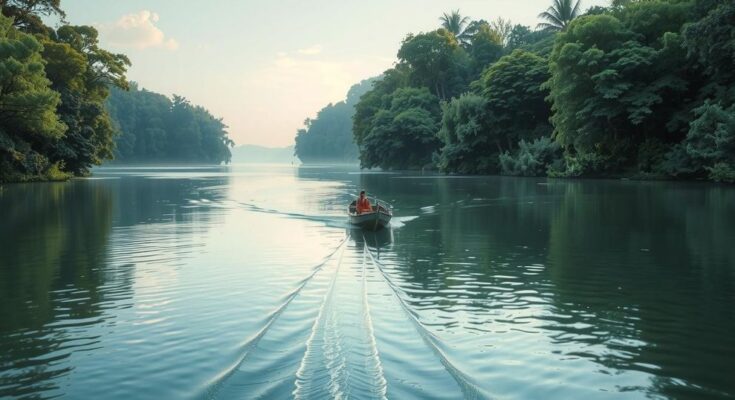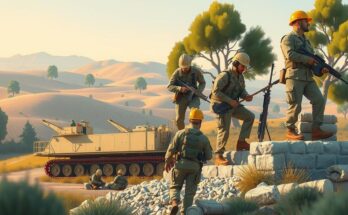The conflict in eastern Democratic Republic of Congo is prompting men to flee to Burundi, risking drowning in the Rusizi River to escape rebel conscription. With ongoing violence from the M23 rebels, over 70,000 refugees have sought safety, facing perilous conditions and loss. Authorities are limiting border access for men, heightening tensions, and prompting concerns from humanitarian agencies about the growing crisis and the need for support.
In the Eastern Democratic Republic of Congo, some men are risking their lives by swimming across the treacherous Rusizi River to avoid conscription by M23 rebel forces. Jordan Bita, a 25-year-old, described how he clung to his belongings while navigating the dangerously swift waters to reach Burundi, fleeing from the escalating conflict as M23 rebels seized key cities such as Goma and Bukavu in recent weeks.
During his escape, Mr. Bita found that avoiding main roads was crucial, stating, “This is because M23 fighters are everywhere and they are forcing us to join them to fight against the government.” Currently, nearly 70,000 people have fled to Burundi, where they are met by troops monitoring the riverbanks. The urgency of their flight is highlighted by the significant dangers of drowning, which has claimed the lives of at least 20 individuals in recent attempts to cross.
Clarice Kacindi recounted a tragic incident, sharing the heartbreaking loss of her three-year-old child while navigating the river on an overcrowded raft. She lamented, “M23 are making our lives very difficult. They must stop this war. Even if I wanted to go back home, I’ll be forced to start from scratch.” Many refugees are now seeking asylum in conditions that are overcrowded and dire, with half of them reliant on one meal a day.
While the primary border post at Gatumba sees a continuing flow of refugees, Burundian authorities have restricted men from crossing, insisting they remain behind to help defend against the M23 advance. This restriction increases tensions as Burundian troops are currently deployed in DR Congo to assist local military forces against the rebels. The relationship between Burundi and DR Congo remains strained due to historical ethnic conflicts, further exacerbating fears of violence spilling across borders.
Authorities, including Brigitte Mukanga-Eno from the UN refugee agency, have acknowledged the challenges posed by this unprecedented influx of refugees, stressing the need for supportive measures to prevent clashes in host communities. Furthermore, elderly refugees like Magega Mwarui have witnessed the cycle of violence over decades, underscoring the long-standing instability in the region. Charlotte Odile, another refugee at a temporary camp, shared her hopes of finding safety and a stable home for her family after suffering great losses at the hands of rebel groups.
The humanitarian crisis resulting from the conflict in the Democratic Republic of Congo poses substantial challenges, not only for those fleeing violence but also for neighboring countries attempting to manage the increasing number of refugees. Solutions are necessary to ensure the safety and wellbeing of these displaced individuals while addressing the political and social factors that continue to contribute to the unrest.
The ongoing conflict in the eastern Democratic Republic of Congo has forced thousands of individuals, particularly men, to risk their lives by fleeing to Burundi to escape conscription by rebel forces. As the fighting intensifies, the dangers of crossing the Rusizi River become increasingly pronounced, with notable fatalities occurring. The humanitarian implications are severe, resulting in overcrowded refugee camps and strained relations between Burundi and DR Congo. Solutions and supportive measures are essential to address the needs of these vulnerable populations and to stabilize the region amidst historical ethnic tensions.
Original Source: www.bbc.com




